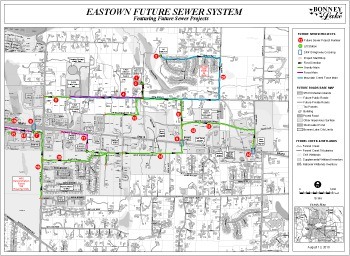It’s finally the beginning of the end of the beginning for Eastown property owners hoping to get a city sewer line installed through their section of town.
Representatives of the Eastown Landowners LLC were on hand at the June 12 City Council meeting to announce they had collected the $201,105 required by the city as their share of the project’s cost.
“We have our money so we’re asking let’s go ahead as quick as possible,” David Bowen told the council, adding that the final easement needed for the “backbone” project is through his property and will be signed and delivered post haste.
Public Works Director Dan Grigsby said he did not expect any trouble in getting the easement through Bowen’s property.
“I have no doubt that we will get it and it will not cause a delay to the project,” he said.
With the money collected and easements in hand, the City Council is expected to move forward to approve a utility latecomers agreement to borrow the money necessary to install the basics of a sewer line through the area, which was annexed into the city 10 years ago, but city policy requiring all new development to hook up to the city’s sewer system, which stops near 214th Avenue East, has hindered developers from buying and building in Eastown due to the cost of installing sewer lines.
The Eastown landowners are required to pay 5 percent of the cost of the system, which was originally projected to be approximately $178,000. However, in April a new estimate on the project increased the cost, bringing the landowner share to $201,000.
Eastown spokesman Roger Watt said the last $23,000 was difficult to gather because while their land is valued relatively high, most are not flush with cash.
“As expected it was difficult for some people,” Watt said of the additional money. “I think it was difficult for everyone to come up with the cash because we’re not all wealthy here in Eastown.”
Watt estimated that 80 percent of the landowners in Eastown are part of the LLC, which was formed when the city council asked the owners to create a single representative entity with which they could negotiate instead on myriad individual landowners.
According to Grigsby, the next step will be to discuss the latecomer’s agreement, which has already been discussed in the form of a memo of understanding, to be discussed at the July 3 council workshop, followed by a public hearing projected for July 10 and a cull council vote expected by July 24.
Watt said the group is hoping to move the schedule up some because of the amount of discussion already completed on this project.
“We’re tired of delays,” he said. “This is not a brand new issue. It’s been on the plate for some time.”
Following that approval, the city will obtain a revenue bond for the full cost of the project minus the landowner contribution, estimated at $4.8 million, then the city will advertise for bids and then construction can begin.
Thus far, the city has already spent approximately $567,000 on design and planning for the project.
Grigsby estimated the total process following approval to take about 15 months, meaning pipes could be in the ground and ready for use as early as fall of 2013, though developers can begin buying land and building sooner because they will have assurance that a sewer line will be there when they are ready for it.
Grigsby said the city is installing a “backbone” system that stretch up 226th Avenue East – tentatively located on the western side of Bowen’s auto yard – from state Route 410 to 96th Street East. It will turn west on 96th and then north up a driveway to a lift station that will be built to push the sewage to the connection at 214th and 96th.
Developers at several parcels will still be required to build the lines on their properties to the main system.
“It’s a backbone,” Grigsby said. “It doesn’t provide these other three legs private development needs to provide.”
As developers connect to the system, the will be required to pay their share of the cost, as per the latecomer’s agreement. That money will pay back both the city and the Eastown LLC.
“One step at a time,” Watt said. “We’re through this step, now on to the next one.”



